Recently, I wrote about the FA-50 for the Argentine Air Force, and how it is urgent to incorporate a weapons system that can replace the units that have already reached their useful life within the force, so that it can fulfill its function of protecting air space.
Faced with this obvious need, the defense ministry had expressed its intention to acquire the FA-50, from Korea Aerospace Industries (KAI), as a “complementary supersonic fighter-bomber” for the FAA.
Subsequently, it was the Minister of Defense himself, Oscar Aguad, who confirmed the rumors of acquisition and stated that negotiations with the Korean company were very advanced, but only the form of financing remained to be established. Apparently, the Export-Import Bank of Korea would be the entity in charge of financing the project through the acceptance of a part of the payment in foreign currency and another in commodities. But before a possible change of administration and a high dollar, the doubt arose as to whether the project would not be put to sleep.
The information is not yet official, but a source within the Ministry of Defense told Zona Militar that the sale is definitively frozen, and filed until further notice, so it will be necessary to wish a warm farewell to the FA-50.
The situation is very frustrating, since the formal request for the replacement of units was presented in 2016 and since then has been looking for a viable replacement for systems that are out of service or in a high degree of deterioration, as is the A-4AR Fightinghawk. The Argentine Air Force was counting on obtaining a more modern system in the short term. Such acquisition offered the hope of shortening, even if only a little, the abysmal distance that exists between the current systems available within the force and the systems that today dominate the skies of the world. On the other hand, in addition to the obvious loss of capabilities, there is a great risk of ending up losing the continuity of activity, and with it, the human capital.
The general feeling is that we will have to wait to define who will govern the next four years and with what agenda. And although we would like to resume the purchase, it is estimated that it will take approximately two years to reactivate the negotiations, bearing in mind that, faced with a possible change of administration, there is a standard period stipulated for each new member to settle into their position, before they can define interests. Thus, it is very likely that the FA-50 project will not see the light of day again… at least not in the short term.















Bueno,los países vecinos ya están pensando en correr los mojones jajaja